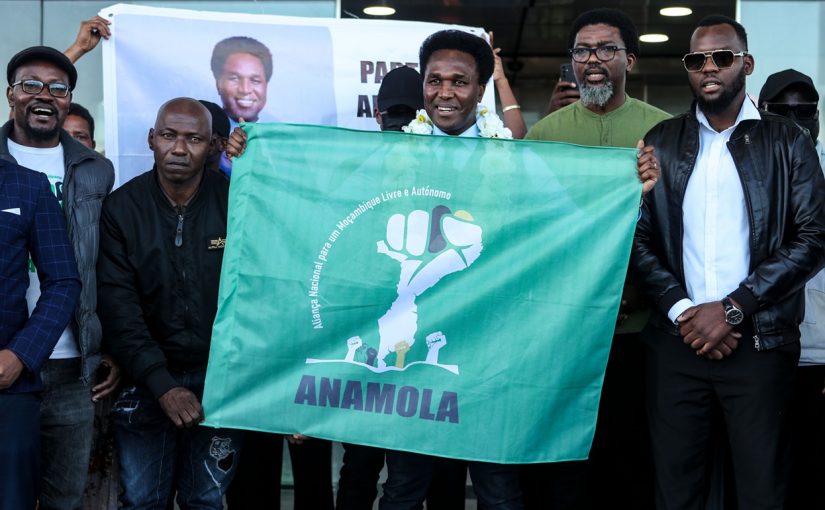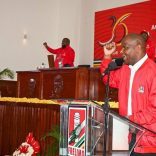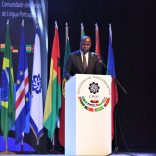Mozambique: Chapo warns against attempts to weaken liberation parties - Photos
Mondlane calls Mozambican elections fraudulent, insists on Anamola being included in ‘Inclusive Dialogue’

File photo: Lusa
Mozambican politician Venâncio Mondlane stated on Saturday, 4 October, the 33rd anniversary of the General Peace Agreement (GPA), that elections in the country continue to be fraudulently managed. He also reiterated his party’s demand to be included in the ongoing national political dialogue.
In a statement posted on his Facebook page, Mondlane said that “the elections continue to be fraudulently managed, and their perpetrators remain unpunished before the law.” He added that “reconciliation has become nothing more than a meaningless word. Political tolerance is now an increasingly distant mirage, because thinking differently from the current regime is treated as a crime of lèse-majesté, punishable by death or social exclusion.”
In the same statement, Mondlane again condemned what he described as exclusion from the political dialogue aimed at reforming the state. “We were the forerunners of the need for dialogue, but they chose to exclude us under the pretext that we are not represented in the Assembly. Even if we were, they would certainly find another subterfuge, because the true objective is to silence us,” he said. “Even so, our ideas on constitutional and electoral reform will be made known. We demand to be present, not only to present our contributions, but also to denounce any manoeuvres disguised as reforms.”
The National Alliance for a Free and Autonomous Mozambique (Anamola), a party founded by Mondlane, sent a letter to President Daniel Chapo on 25 August, formally requesting its inclusion in the national political dialogue and proposing that the matter be brought before parliament.
On 10 September, Mondlane clarified that Anamola seeks participation in the Technical Committee for National Dialogue (COTE), following the rejection of its requests by the presidency.
President Chapo signed the Law on the Political Commitment for an Inclusive National Dialogue in April, following its approval in parliament. The law, which emerged from an agreement with political parties signed on 5 March, aims to address the violence and unrest that followed the general elections held on 9 October 2024.
As part of the agreement, COTE was established to oversee a two-year national dialogue process. It will cover key issues such as the definition of republican and non-partisan security forces, the development of a new electoral model, constitutional reform, national reconciliation, unity, and the decentralisation of government.
According to a statement from the Presidency of the Republic, the public consultation phase of the inclusive dialogue, covering the provinces and the diaspora, is set to begin on Sunday, 5 October. The statement added that “brigades will be created to work in all provinces, all districts, and the diaspora, with the aim of listening, consulting, and creating a space for all people (individuals and groups) to participate.”
Mozambique has been facing a climate of social unrest since the disputed 2024 general elections. Demonstrations and strikes led by Mondlane followed the announcement of the results, which confirmed Daniel Chapo, supported by the ruling Frelimo party, as the country’s fifth president. Mondlane has consistently rejected the results.
Saturday, 4 October also marked 33 years since the signing of the General Peace Agreement in Rome in 1992, which ended 16 years of civil war between the Mozambican government and Renamo. The conflict, also known as the “16-Year War,” claimed an estimated one million lives and caused widespread destruction. The GPA was signed by then-President Joaquim Chissano and Renamo leader Afonso Dhlakama, paving the way for Mozambique’s first multiparty elections in 1994.
On 29 July, Renamo criticised President Chapo for calling for a re-evaluation of the GPA, accusing him of promoting “intolerance and governmental arrogance.”
The criticism followed a 17 July address by the president to members of the Defence and Security Forces, in which he suggested rethinking the compliance and relevance of the GPA and its subsequent understandings.












Leave a Reply
Be the First to Comment!
You must be logged in to post a comment.
You must be logged in to post a comment.